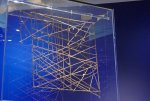LittleSister
Well-Known Member
Will future navigantes no what they missed as the approach an iron bound coast with only a ep.Just sailing to Spain prior to gps etc there was a true sense of accomplishment ?
Do we know what we miss, given that earlier seafarers sailed without compass or charts?
We can't actually know the mindset, skills and knowledge involved.
People sailed for many thousands of years before 'maps' (that we would even recognise as such) were invented. The earliest 'maps' were for a long time far too expensive to be owned by seafarers, let alone carried by ships. Even when charts became common, they had little information, by our standards, and tended to vary in scale across the chart - the areas of interest (hazards, harbour entrances, etc.) were drawn at a larger scale than 'boring' bits of coast of little interest. They weren't interested in exact bearings and distances, as most had no means of measuring these accurately anyway.
Our maps and charts, our related navigational instruments, and more generally the way we understand our world and find our way around seem obvious and rational to us, but they are very culturally specific - in other times and other places they would be meaningless.
Conversely, how other cultures 'navigated' is largely a closed book to us - we can only get hints, and can never fully share the way they conceived their world and found their way about its seas and oceans.

